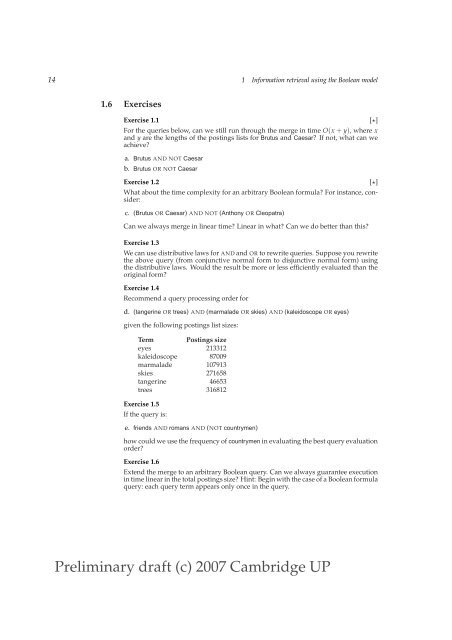Preliminary draft (c) 2007 Cambridge UP - Villanova University
Preliminary draft (c) 2007 Cambridge UP - Villanova University
Preliminary draft (c) 2007 Cambridge UP - Villanova University
You also want an ePaper? Increase the reach of your titles
YUMPU automatically turns print PDFs into web optimized ePapers that Google loves.
14 1 Information retrieval using the Boolean model<br />
1.6 Exercises<br />
Exercise 1.1<br />
For the queries below, can we still run through the merge in time O(x + y), where x<br />
and y are the lengths of the postings lists for Brutus and Caesar? If not, what can we<br />
achieve?<br />
a. Brutus AND NOT Caesar<br />
b. Brutus OR NOT Caesar<br />
Exercise 1.2<br />
What about the time complexity for an arbitrary Boolean formula? For instance, consider:<br />
c. (Brutus OR Caesar) AND NOT (Anthony OR Cleopatra)<br />
Can we always merge in linear time? Linear in what? Can we do better than this?<br />
Exercise 1.3<br />
We can use distributive laws for AND and OR to rewrite queries. Suppose you rewrite<br />
the above query (from conjunctive normal form to disjunctive normal form) using<br />
the distributive laws. Would the result be more or less efficiently evaluated than the<br />
original form?<br />
Exercise 1.4<br />
Recommend a query processing order for<br />
d. (tangerine OR trees) AND (marmalade OR skies) AND (kaleidoscope OR eyes)<br />
given the following postings list sizes:<br />
Term Postings size<br />
eyes 213312<br />
kaleidoscope 87009<br />
marmalade 107913<br />
skies 271658<br />
tangerine 46653<br />
trees 316812<br />
Exercise 1.5<br />
If the query is:<br />
e. friends AND romans AND (NOT countrymen)<br />
how could we use the frequency of countrymen in evaluating the best query evaluation<br />
order?<br />
Exercise 1.6<br />
Extend the merge to an arbitrary Boolean query. Can we always guarantee execution<br />
in time linear in the total postings size? Hint: Begin with the case of a Boolean formula<br />
query: each query term appears only once in the query.<br />
[⋆]<br />
[⋆]<br />
<strong>Preliminary</strong> <strong>draft</strong> (c)<strong>2007</strong> <strong>Cambridge</strong> <strong>UP</strong>



